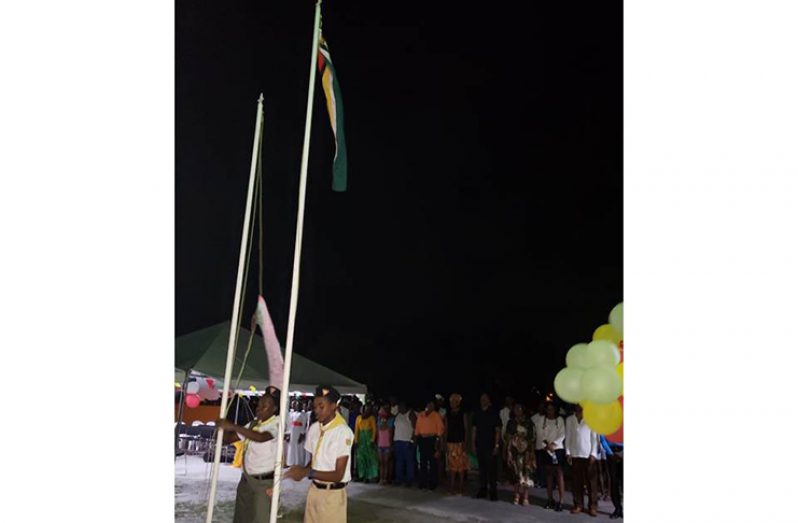…AG assures residents gov’t laying groundwork to revitalise village economies
VICTORIANS on Thursday celebrated the village’s 179th anniversary with a cultural programme, during which Attorney-General Basil Williams reminded residents of the great struggle and sacrifice of their ancestors and his government’s plans to revitalise village economies.
The event was coordinated by the Victoria Youth Development Organisation
Under the theme, “Commemorating our ancestry and redeeming our legacy.”
The programme, held outside of the Victoria Community Centre Ground, was attended by scores of villagers. It was punctuated with prayers, songs, poems and cultural activities in the form of drumming and dance in keeping with the theme. Willams, who delivered the feature address, said he was pleased to be in the village, which he considered the mother of the Village Movement, given that it was the first village bought by freed slaves.
Williams related that next year around this time, they will be marking the 180th Anniversary of the purchase of Plantation Northbrook by 83 free men and women from five plantations such as Ann’s Grove, Dochfour, Enmore, Hope and Paradise, who pooled their savings and agreed to purchase the plantation Northbrook which they renamed Victoria. Williams told the gathering that, that simple financial transaction, by unlettered men and women, transformed the then colony of British Guiana.
The minister added that the purchase of a single plantation and its conversion into a village laid the foundation for establishment of a nation. He told the large crowd that Victoria is a model village which has been bequeathed “by our ancestors. It is a model which is now being made more relevant to the present time and to extant challenges. Village revival is a work in progress.”
Williams said, “In doing so, we must be careful not to discard those central ideas which inspired the village movement – the notions of economic independence and communal solidarity. Our government is committed to ensuring that our villages are transformed into centres which can support economic independence. Our government – the one I represent – is placing emphasis on revitalising the economics of villages so as to ensure the provision of sustainable livelihoods.”
He stated that development, if it is to be impactful, must reach down to the grassroots. “Development for us permeates through to our villages and percolates within them. It is the philosophy of your government that the economy of the village must be revived if people-centred development is prioritised. We are therefore, committed to improving the economics infrastructure – roads, bridges, irrigation and electricity – to support village economics, including the development of your farmlands,” he said.
Williams noted that the government is stimulating entrepreneurship and enterprise in order to invigorate the economies of villages, particularly in developing cottage industries and small and medium scale enterprises. “Your government is supporting the continued quest of people for economic independence. We see villages as important to generating jobs and wealth for our people. We will continue to support the development of economically vibrant villages,” the minister said.
He stated that the reintroduction of local government elections in 2016 was a first step in the empowering of villages to having a greater say in the management of their communities.
Williams said local government elections are over and the government is committed to respecting the democratic will of the people and working with all elected local authorities– regardless of which party of group is in control – to reboot the economies of our villages and ensure improved public service to residents.
SOCIALLY COHESIVE
Williams said one of the key planks that undergirded the historic village movement was the notion of the village as communities of solidarity. He said many lands, which were developed into villages, were purchased by groups of individuals. “The joint proprietors had the task of organising and planning the development of these communities.
They also set about establishing places for worship, education and recreation,” Williams told residents.
He said the imperative of working together to provide common services spawned human and communal solidarity, noting that villages developed a spirit of oneness. “Everybody knew everyone else; they supported each other in times of distress and sorrow; they practised self-help and they worked collectively for the benefit of the community. Elders were respected. People helped one another.”
According to the attorney general, these are the values around which community life should be revived. “Villages should become socially cohesive units promoting inter-ethnic harmony and promoting cultural activities on weekends. The playfields must come alive after school with athletic and other physical pursuits for young people. Villages should be made safer, more secure and more caring.
This is what your government is seeking to achieve. It is to this mission that we are committed, a mission consistent with the spirit of 1839. That spirit is being rekindled right across communities. Village economies are being revitalised; community spirit is being rejuvenated.” He thanked the people of Victoria for their efforts in reviving and rejuvenating the spirit of 1839 and also lauded the organisers of the programme.


.jpg)











